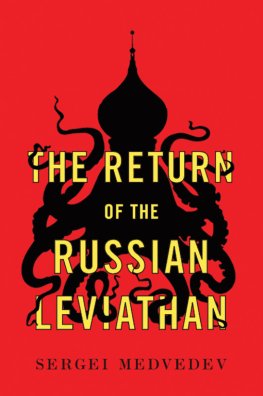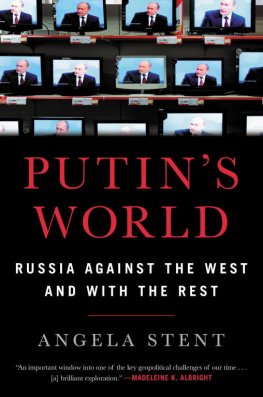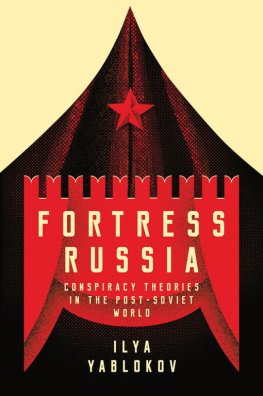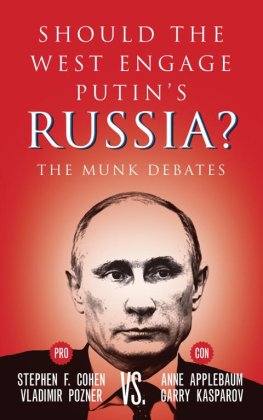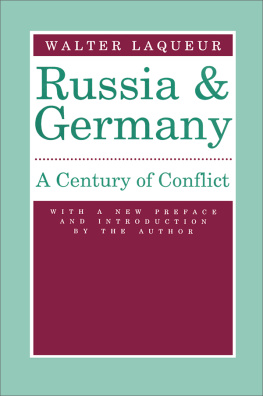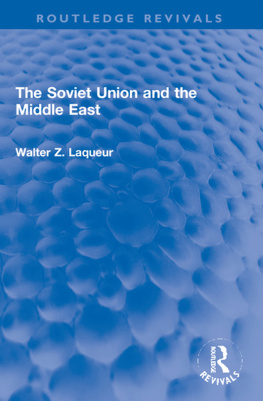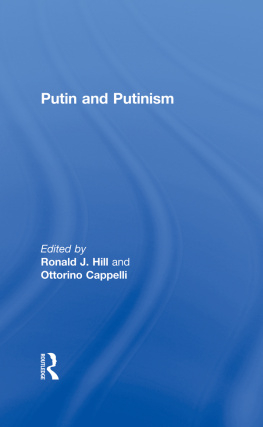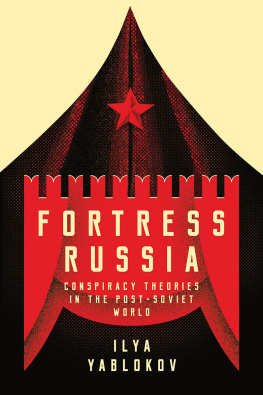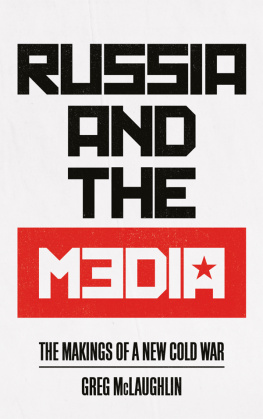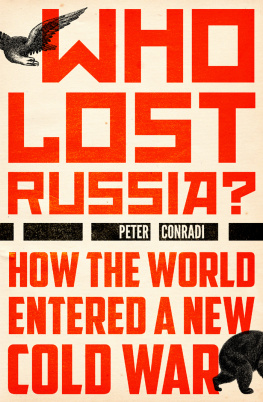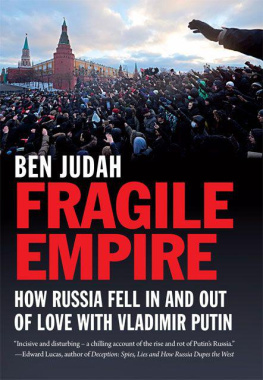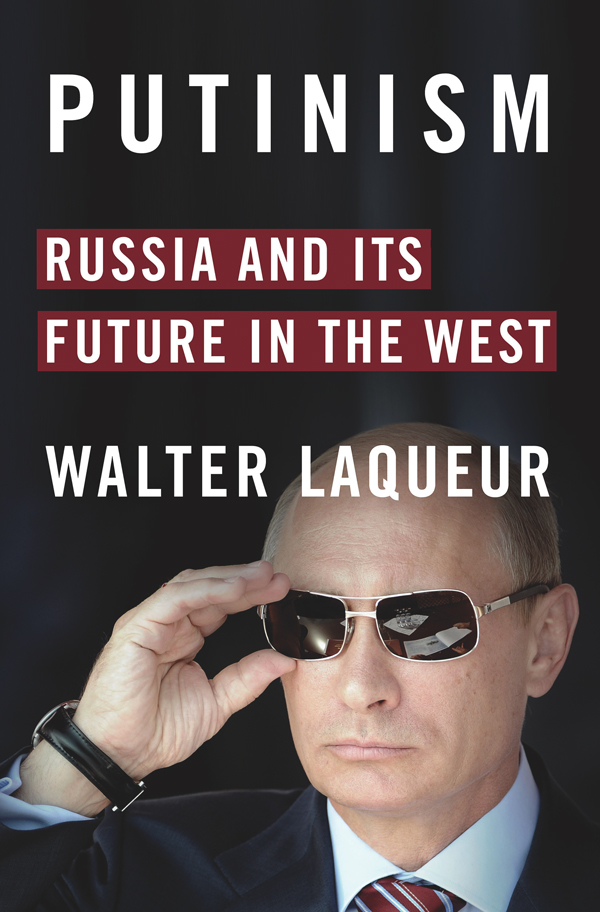Contents
Guide

The author and publisher have provided this e-book to you for your personal use only. You may not make this e-book publicly available in any way. Copyright infringement is against the law. If you believe the copy of this e-book you are reading infringes on the authors copyright, please notify the publisher at:
us.macmillanusa.com/piracy.
In memory of two of my gurus:
George Lichtheim (19121973)
Hans (Tom) Meidner (19142001)
This is an attempt to assess the prospects for Russias future and above all the emerging Russian idea (ideology or doctrine) replacing communism. Such an endeavor involves various scenarios, some more likely than others. Unfortunately, quite often the less likely have happenedor some that appeared so outlandish, no one dared mention them (or did so under the wrong assumptions).
Of the last half dozen leaders chosen to govern the Soviet Union and Russia, all but the last came as no great surprise. All were members of the Politburo, the leading governing body: It stood to reason that a member of this body would be the next leader of the country. The choice of Vladimir Putin was far more accidental, but the policies he pursued were not. Observers of the Russian scene have argued that Putins rise to power was resistibleinfluenced perhaps by one of Bertold Brechts less impressive plays written during the Nazi era about the resistible rise to power of Arturo Ui, the king of the cauliflower trade. But the evidence for such claims is not exactly overwhelming. True, in principle about anything could have happened following the disastrous and chaotic Yeltsin years. But given all that was known about Russian history and traditions and current Soviet affairs, the emergence of a nationalist autocracy was far more likely than any other development even in the 1990s. (Walter Laqueur , The Long Road to Freedom, New York, 1989). Some economists have written that the oil and gas bonanza can account only for half of the Russian national income in the Putin era. True again, but the oil and gas income was decisive, it accounts to a large extent for the rise in the economy in general, for the various social and political schemes initiated by the Putin government from which the population benefitted, and last not least for Putins foreign and military policy in 2014/5. At the present time, the choice of the next leader or leadership will likely prove difficult because there is no Politburo anymore.
It seems obvious to predict that Putins successor will conduct the same or similar policies, domestically and abroad. It is unlikely that he will be more moderate. But there are no certainties. Much depends on the situation prevailing at the time within as well as outside Russia. Much may depend on the strength or weakness of the successor, the presence (or absence) of a rival (or rivals). Perhaps there will be a struggle for power among several candidates.
To pursue a discussion along these lines, it is necessary to go over familiar ground, to recapitulate (or try to interpret) the events that have taken place since the fall of the Soviet Unionthe rise of Mikhail Gorbachev and the other parents of glasnost and perestroika, the age of Boris Yeltsin and of Putin.
More than twenty years ago, in a study of the extreme Right in Russia ( Black Hundred ), I tried, as I put it at the time, to differentiate between the legitimate concerns of Russian patriotism and the pathological fantasies of the extreme Right. I also said that given Russias precarious situation, the Right holds firm to its belief that time works for us and it is their ambition to restore Russias position as a global power. Moreover, The Far Right will play a crucial role in the coming years. I mentioned Pushkin a few times but Putin did not appear in this book. In fact, he did not appear in any book known to me. On the other hand, I dealt with Alexander Dugin in some detailhis was not yet a household name at the time. But there is true sincere patriotism and krasnoi (beer hall) patriotism, rejected and ridiculed as empty and meaningless by leading Russian nineteenth-century thinkers such as Belinsky.
What did I mean by the phrase the legitimate concerns of Russia? Precisely this: the attempt to regain at least some of what had been lost. I am not particularly proud of this feat of prophecy. But I find it difficult even now to understand the optimism among many with regard to the prospects of democracy and freedom in Russia. Most likely it was wishful thinking, the satisfaction that the Cold War was finally over and we could devote our time, energy, and resources to the truly important tasks facing us at home. Given Russias history, what ground was there for such optimism?
It seemed obvious that Russia would try to regain its status as a world power once the conditions to do so existed. After all, Germany had been defeated in World War I and had to suffer the consequencesyet within fifteen years, it was back as a leading power. Such comebacks have happened repeatedly in history and most likely would happen again.
It seemed equally obvious that the general trend of the Russian search for a new doctrine and mission would be toward the authoritarian Right, though I should admit that I did not anticipate it would go quite so far and happen so fast. To clarify this point: Russia at the present time is a dictatorship with much popular support, but I do not believe that the invocation of fascism is very helpful. Nor do I think it likely that it will reach this stage in the near future. Comparisons with the clerical Fascist regimes in Europe during the 1930s, with Francisco Francos Spain, or with some of the dictatorships in the developing countries after World War II seem closer to the mark.
But Russia has gone far in this direction. How much further will it go?
I found it strange, even ludicrous, that the Left outside Russia has hardly been aware of the ideological and political changes in Russia and continues to think of Russia as left-wing in some ways. Perhaps it has to do with the fact that the distance between populism of the Left and populism of the Right has become difficult to detect. What difference is there between present-day Russian communism and the Vladimir Zhirinovsky party? Since both vote with the government on all the important issues, there is no true political opposition in Russia. Sometimes it appears that even the intelligentsia in Russia has disappeared. The extreme Right in Europe has been much quicker to understand the changes in Russia and adjust its propaganda and policy accordingly.
I am dealing in the present book with the new doctrine gradually emerging in Russia. Most countries, even most great powers, are able to exist without a doctrine and a mission or manifest destiny, but not Russia. Its doctrine or ideology has several components: religion (the doctrine of the Orthodox Church, Russias holy mission, the third Rome, and the New Jerusalem), patriotism/nationalism (with occasional leanings toward chauvinism), geopolitics Russian style, Eurasianism, the besieged-fortress feeling, and zapadophobia (fear of the West, coined by the philosopher-ideologue Nikolay Danilevsky as zapadnichestvo, for Westernism). Students of early Russian literature know that the belief in Russias uniqueness goes back virtually to its beginnings; the writers (often merchants) who had been abroad returned with the conviction that Rus was unique, without parallel. This goes, for instance, for Afanasy Nikitin from Tver, who had been to India many years before Vasco da Gama; for Nestor Iskander, who wrote about the fall of Constantinople; and for Maxim Maximus, a monk from Mount Athos who had been invited to Russia and settled there. Further, this conviction was usually paired with another beliefthe suspicion of Russophobia, the certainty that all foreigners were against Russia. (Such fears were not specifically Russian; in the very first articles in which an American manifest destiny is mentioned in the 1830s, we also find references to the assertion that virtually all foreigners were hostile toward the United States.) Why this should have been the case is unclear, for the attitude of the outside world toward Russia under Ivan III and Ivan Grozny (the Terrible) was one not of hostility but of profound lack of interest.


